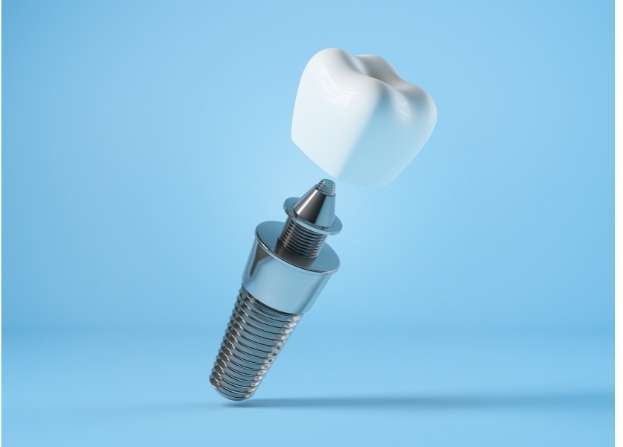Unlike dental bridges, implants do not rely on adjacent teeth for support. Bridges require the reshaping of healthy teeth to support the replacement tooth, which can increase the risk of decay in those supporting teeth. Dental implants are a standalone solution that does not compromise the health of surrounding teeth.
Dental Implants
Dental implants offer a long-term solution for missing teeth, providing comfort and function that closely mimics natural teeth. Unlike removable dentures, dental implants are permanently fixed, allowing you to enjoy a wider variety of nutritious foods and contributing to your overall well-being. They also play a crucial role in preventing future dental issues, such as bone loss in the jaw, often associated with missing teeth.

The Advantages of Dental Implants Over Dentures
The permanence of dental implants is a significant advantage. Unlike traditional dentures, which can be cumbersome and require adhesives, dental implants are a stable and reliable solution. They eliminate the discomfort and inconvenience of ill-fitting dentures, ensuring a perfect fit that doesn’t require frequent adjustments or replacements.
Understanding Dental Implants
Dental implants are artificial tooth roots, typically made from biocompatible titanium. These implants are surgically placed into the jawbone, where they fuse with the bone through a process called osseointegration. This process creates a strong and stable foundation for replacement teeth, known as crowns. Dental implants not only enhance your appearance but also boost your self-confidence and improve speech clarity compared to missing teeth or poorly fitted dentures.

Quality of Life Improvements with Dental Implants
Beyond the functional benefits, dental implants significantly improve your quality of life. By restoring your ability to eat a wider range of foods, you can enjoy a more balanced and nutritious diet. This freedom from dietary restrictions can have a positive impact on your mood and overall well-being. Furthermore, dental implants can dramatically improve your smile and self-esteem. Many patients who have received dental implants report a significant increase in confidence and a renewed desire to smile. In addition, dental implants can improve facial aesthetics by ensuring proper jaw alignment, which can result in a more balanced and youthful appearance.
Treatment Timeline for Dental Implants
The duration of dental implant treatment varies depending on individual health conditions, the type of implants needed, and the number of implants required. The procedure can range from a single day to several months. Typically, the initial phase involves placing the implant into the jawbone and allowing it to heal. This procedure usually takes 1-2 hours, with a healing period of 3-6 months. Once the implant is securely integrated, the artificial tooth (crown) is attached. This final step may require one or two visits. For patients needing full mouth restoration, it is possible to have implants and prosthetic teeth placed in a single day, although the overall healing time remains approximately three months.
Longevity of Dental Implants
With proper care, dental implants are designed to last a lifetime. Maintaining good oral hygiene, including regular brushing and flossing, is essential for the long-term success of your implants. If you experience any unusual pain or discomfort after your procedure, please contact MyDentist immediately.
Determining Candidacy for Dental Implants
Not all patients are suitable candidates for dental implants. Generally, good overall and oral health is required. Conditions such as uncontrolled diabetes, active cancer treatment, or uncontrolled periodontal (gum) disease may affect the success of the implant procedure. During your consultation, our dentists will assess all relevant health factors to determine the best treatment plan for you.
Mini Dental Implants: An Alternative Option
For patients with bone loss who may not be eligible for standard implants, mini dental implants offer a viable alternative. These smaller implants require less bone space and are often used to secure advanced dentures or partial dentures. Mini implant-supported dentures provide greater stability and allow patients to enjoy a wider variety of foods compared to traditional dentures. Mini implants can also be a more affordable option for full mouth restoration. A consultation with our dentist will help determine if mini implants are right for you.
Caring for Your Dental Implants
Maintaining your dental implants is similar to caring for natural teeth. Regular brushing twice a day for two minutes, along with daily flossing, is essential. With proper oral hygiene, your implants can provide you with a healthy and beautiful smile for years to come.
Understanding the Cost of Dental Implants
While the initial cost of dental implants may seem higher than other options, they are often more cost-effective in the long run due to their permanence and lack of need for adjustments or replacements. The cost of dental implants varies depending on your specific needs and treatment plan. We understand that cost is a concern for many patients, and we encourage you to discuss your financial options with us. Dental implants are a valuable investment in the long-term health of your smile.
Dental Implants vs. Bridges
MyDentist Services
Get In Touch With Us
MyDentist@Middlefield
5200 Finch Avenue E #104, Scarborough, ON M1S 4Z3
Mon – Fri: 10:00 am – 8:00 pm
Sat: 10:00 am – 5:00 pm
647-340-8878
info@my-dentist.ca
MyDentist@Pharmacy
636 Pharmacy Ave, Scarborough, ON M1L 3H5
Mon – Fri: 10:00 am – 8:00 pm
Sat: 10:00 am – 5:00 pm
647-500-7885
pharmacy@my-dentist.ca
Book An Appointment
Book a visit to MyDentist, simply fill out the form below and we will contact you back regarding the intervention you require.



